#i'm a feminist and feminism is clearly still necessary but like
Text
'yeah i'm totally trans-inclusive, as long as you don't expect me to remember that womanhood doesn't map tidily onto the ability to get pregnant [some women are postmenopausal! some women are infertile! some women don't have uteruses, and not even all of those women are trans!], or to ever frame anything in a way that isn't Men Vs Women As Antagonistic Binary! unbelievably insulting of you to suggest otherwise!'
#like was the OP of that post overtly T*RF-y when i clicked thru? no.#did their blog remotely suggest they cared at all abt trans ppl? also no.#did like half their posts talk abt Men as though there was no possible overlap ever between Men and Women? uh‚ yup!#like. this will be the last post abt this unless something else happens—i turned off anon asks finally bc fuck that—but it's just like#this isn't even abt 'careless wording' it's abt wording that's entirely consistent with the way the last many posts in yr blog frame things#and it isn't abt splitting hairs‚ it's abt having an accurate understanding of who these things affect#and not deciding that other ppl constitute sufficiently small fractions of the picture that you can just generalize them out of it entirely#which is a key piece of the master's toolset and will not dismantle the master's house!#like. to reiterate something i said privately earlier: swallowing the normative definition of Womanhood wholesale#is a terrible starting point from which to challenge the normative treatment of women#i'm a feminist and feminism is clearly still necessary but like#if you're going to slice off all the bits that don't fit neatly into the glass slipper... that's not any kind of feminism i want#or indeed recognize as feminism#like. sorry. if the 'language that's most convenient and accessible to you' is harmfully inaccurate…#*you're* the one who needs to work on your framing#it isn't fucking semantics. it's revealing real things abt yr worldview that harm and erase real women.#also like. if you're more insulted by the idea that a stranger didn't fully investigate you to find out whether the whiff of T*RF was Real#than by the reality that you're peddling rhetoric T*RFs use *all the time* to support their bigotry—you might in fact be exactly the bigot#you protest being labeled as! bigotry is worse than having someone say 'maybe a bigot‚ kinda smells like one' about you in passing!#truly too many tags i'm just mad.#(and unlike the blogger in question and their buds will not be venting by sending Nasty Ad Hominem Anons)#(so it's all just going right here.)#in conclusion no‚ i don't trust you to use cisnormative language bc you're 'TOTALLY going to come back and collect the rest of us later!'#you absolutely will not!#ugh. okay. enough.
32 notes
·
View notes
Text
I just saw Barbie. I'm writing meta about it. This is your spoiler warning. Do not read past this if you don't want to be spoiled. Additionally I'm going to discuss radical feminism and liberal feminism. I am neither I'm a feminist, but as a trans person I find both strains to be inaccessible and I prefer a more intersectional approach, just to state my bias upfront. Additionally I anticipate getting multiple "it's not that deep" comments on this meta. To which I respond that the movie may be deeply unserious at times but it does try to tackle gender which means we should get to talk about it.
I do want to acknowledge that this is the movie of the year, and that it's made by Mattel and Warner Brothers and as such it was literally never going to be based and the best we can hope for is what it was, which is liberal girlboss feminism. The movie was very fun and very good and it did have a surprisingly coherent view of gender and it did some things that I did like when it came to that HOWEVER as a gay transgender man watching the movie it's lack of a queer perspective was very obvious to me and took me out of it occasionally.
So I just want to establish for those who have not seen it but are reading this meta how gender works in this movie. And to recap the movie with a focus on the gender stuff rather than the main Pinocchio plot. The movie starts in Barbie land where Barbies have a good day every day and Kens only have a good day when Barbies smile at them. In Barbie land all the powerful jobs are occupied by Barbies and all the Kens have the nebulous job of "beach" which means that whatever the Barbies decide goes and the Kens are more or less subject to their whims (no word on how the Midges or Skippers or Allen fit into this barbie based higherarchy. One could guess based on a couple of scenes but it's never really lingered on)
Ken(Ryan Gosling)'s world revolves around Barbie(Margot Robbie). Ken(RG) is Barbie's(MR) boyfriend, but Barbie is good friends with Ken(Simu Liu) who she dances with and who is generally less cringefail than Ken(RG). Ken(RG) is frequently jealous of Ken(SL). Ken(RG) is also somewhat taken for granted. Barbie doesn't seem to care that much about him. He tries to kiss barbie, she doesn't reciprocate. Ken tries to hang out with Barbie, she kicks him out because it's girls night, as it is every night. So on and so forth. Barbie is not obligated to care about Ken, but she's clearly not putting in any work into maintaining this creator ordained relationship and it's clearly upsetting to Ken.
Barbie is experiencing some Real Girl tm problems such as flat feet and thoughts of death and weird Barbie who has been played with too much sends her into the real world to fix it. Ken(SL) goads Ken(RG) into going with Barbie into the real world. When Barbie learns Ken is coming her immediate assumption is that he'll slow him down.
When Ken and Barbie enter LA Barbie immediately starts experiencing Misogyny. Ken similarly starts experiencing privileges as a man which he did not have in Barbie land. This is heavy handed. Barbie verbally states that she feels like she's being gawked at in an almost violent way and Ken says he feels admired in a not at all violent way (with the outfit Ken was wearing and how he was still carrying himself with deference to barbie I sincerely doubt he would experience exactly 0 homophobia but it was necessary for him to feel that way in order to make his character arc work so I'll let it slide).
Ken goes for a walk without Barbie while barbie does plot relevant activities. He sees women showing respect to men, he sees a slide show of some kind of male role models. He feels like he can be something in this world. So he goes to a middle school library and picks up some books about patriarchy. He tries to get a job in the real world, it goes poorly, so he decides to go back to Barbie land and establish patriarchy there.
Barbie comes back to Barbie land with a friendly human woman named Gloria who works for Mattel and her MCR listening 12 year old daughter. On the way she tells her new human friend and her daughter that Barbies are in charge in Barbie land and women have all the important jobs. But as they drive into Barbie land they find that Ken has gone full radfem in their absence. He's flipped the Barbie-Ken higherarchy on its head. He's turned the dream house into a man cave. And he's some how convinced the Barbies to behave like sandwich making foot massage providing girlfriends.
And here's where I would like to start doing some meta. What has happened here? Ken is essentially a (less complex than human on account of being a doll) cisgender heterosexual white woman. He is in proximity to the ruling party, Barbie who is like a cishet white man. Ken is not on the margins the way that Allen and Midge are. His occupation is Barbie's boyfriend. Ken got a taste of what it was like when the gendered oppression that he is used to is flipped and he decided that's what he wants. He doesn't much care how the discontinued dolls feel about this, he's not thinking about them, nor is the movie. He doesn't really see a problem with there being a division between Barbies and Kens, he doesn't see a problem with one group being subservient. He just doesn't want to be low on the food chain. Ken is right to want liberation for Kens but he thinks that he can obtain that by taking the jobs away from Barbies and giving them to kens. This is why I said Ken has gone full radfem in Barbie's absence. He hasn't gotten rid of the gender essentialism, he hasn't questioned whether power should be shared between Barbies and Kens. Ken is right to throw Barbies shit out of the dream house and kick her to the curb, she doesn't value him like he deserves from a relationship. He's wrong to try to change the constitution to put Kens in charge and change it to Kenland and force all Barbies into the position that Kens previously occupied. I relate this to radfems because radical feminism relies on bioessentialist assumptions and posits that men are always oppressors by their nature and that women would be better off without them. A lot of what makes terfs angry at trans women is that trans people question whether women and men are so easily separately boxed like this and trans women specifically are seen as male infiltrators. Most of them succumb to becoming transphobes before people but on a base level radical feminism is a reactionary hatred of men that is usually based in genuine hurt. Ken is on some all Barbies are pigs shit here rather than examining society and attempting to make it more equitable. I think he needs to sit down with Magic Earring Ken and talk about gender to gain some perspective.
Both me and the movie agree that Kens knee jerk Ken liberation at the Barbies' expense is wrong. Ken even later acknowledged that he didn't even care about patriarchy he just wanted to feel valued. But where me and the movie start to be at odds is when they do a girl boss style ousting of the Kens. Gloria gives a speech about the female grievance she has from the real world and it somehow works on the Barbies despite the fact that the movie previously established that sexism and all of its intricacies and the feelings it engenders are completely foreign to the Barbies. But the Barbies have always been in charge in Barbie land. They're passingly familiar with real world sexism as an abstract concept that they believe they defeated in the 1960s, but they don't experience it, they live in a everyone is valid girlboss utopia. The only way to become ugly is for someone in the real world to play with you too hard, something they can't control. There's no pressure to be pretty because everyone is already pretty and they compliment each other routinely. Barbie doesn't experience any problems being perfect until Gloria starts drawing her with existential dread, and all of the other Barbies are horrified by it as if they've never heard of such a thing. It's a malady that their dear friend is experiencing not a fact of life like it would have to be for Gloria's message to land.
Then they come up with this plan and they free the Barbies and use romantic jealousy to turn the Kens against each other. My problem with this is that in the established world where Kens are the repressed gender, this is essentially putting a bunch of dolls who's oppression is based in being a romantic object for Barbie into misery business ass situations. We're really weaponizing the Kens' internalized misandry against them and saying girlboss? The Kennish desire for Barbie's validation is being used as a tool to oppress them and the movie just... Doesn't see it despite seeming to having coherent liberal feminist messaging*.
Speaking of Liberal feminist messaging. When the Kens realize they've been turned against each other they link arms and head to where the Barbies are. The Barbies have put their constitution back in place. Ken(RG) realizes he's lost and he runs inside crying and Barbie comes to comfort him. Barbie pays lip service to Ken finding who he is without her and to them being "Barbie" and "Ken" instead of "Barbie and Ken" but then when the Kens band together and ask for a supreme court justice President Barbie gives them a concession of a lower court justice and the Kens have to work their way up, the voice over stating that maybe they'll get to where women are irl in a couple decades, and this is treated as a victory somehow. Like putting the girl boss barbietopia back in place at the expense of the Kens is somehow better than the Kens doing the same but in the opposite direction. This after she apologizes to weird Barbie and offers her a cabinet position, treating the most ostracized barbie as more valuable then any Ken.
The closest the movie ever comes to acknowledgeing a perspective outside of the Barbie/Ken binary is when Allen tries to leave Barbieland during the Ken takeover. Allen seems discontented with both the barbieocracy and the kenocracy and he tries to escape containment when Gloria and her emo daughter are leaving Barbie land. He argues that no one will give a shit about a life-sized Allen in the real world because nobody remembers Allen and then he tries to leave with them. Gloria and her daughter change their minds and go back to help Barbie and Allen's plot line just ends there.
There's all these cameos from background and discontinued Dolls. Skipper who's boobs get bigger, Barbie who's a camera, sugardaddy Ken, and magic earring Ken are all in weird Barbies weird house, Midge has a house near Barbie but is judged by the voiceover for being a pregnant doll and Barbie seems to agree, and Allen is the only one who doesn't have duplicates and is sort of in the background casting doubt, but they never follow through on these dolls place in the higherarchy. Which is fine, this movie is the Barbie movie, it's about stereotypical Barbie becoming a real girl and going to the gynecologist. But I do think that they established some dolls on the margins and then left them there, and as someone on the margins in real life I want to know what's going on with them. Most people going to this movie are gonna be Barbies and Kens so they don't touch on it and I think that's kinda sad, but not every movie has to be for me I guess.
TL;DR: the Barbie movie lacks a queer perspective and has some moments where it's stated gender metaphor falls apart because of its necessarily liberal politics.
All that said. I liked the movie. I'm leveling this criticism because it was better than I expected it to be. I didn't expect to go into the theatre and think about gender like that and I did so it deserves points for that even if I have problems with the execution. I thought it would be a shallow Pinocchio plot but it did something fresh with the doll who wants to be a real girl plot and it was genuinely good cinema in terms of the effects and the music and the visual motifs. It was a fun experience I laughed several times. I would recommend it despite being critical of it.
*coherent in that it is a message that has semi consistent internal logic not in that it's internal logic is correct or sound.
75 notes
·
View notes
Text
i hate that emma watson refused to wear a corset in the beauty and the beast live action movie because "feminism" or whatever so we ended up with this terrible dress. like, did they SCREENPRINT those curlicues on?
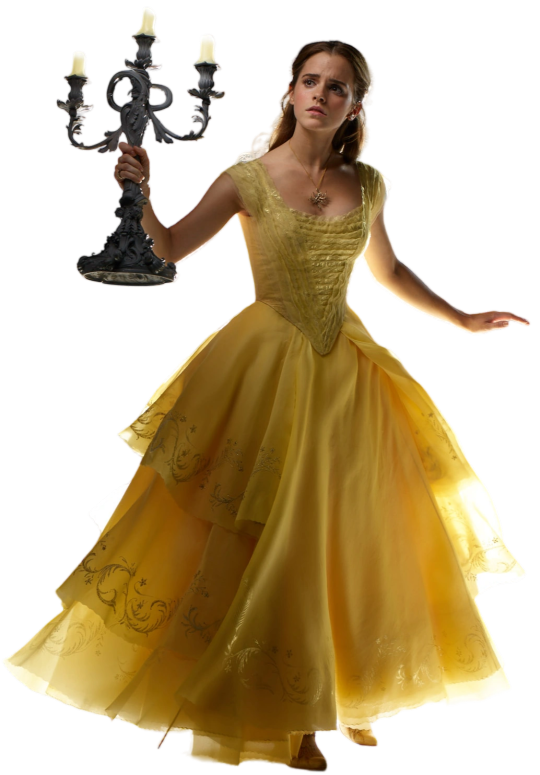
Corsets are pretty much necessary if you're going to wear a shit ton of heavy skirts. I'm not going to defend the corseting in the Cinderella movie because clearly they did that actress dirty by tight lacing a corset not even built for her (also, it's much harder to tight lace someone who is already thin compared to someone with a meatier waist), but there's a reason that dress looked so much better than Emma's. If you want a big poofy skirt that sticks out real far, you need tons of layers underneath, and all that shit is HEAVY. Corsets were used to support all that weight. They were practical for big skirts, on top of being supportive garments that made tailoring your dresses much easier.
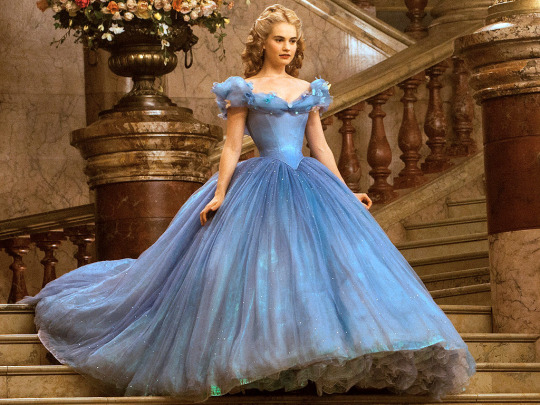
It also means your clothing lasts longer-- when the corset takes the strain of your body against it, it means there isn't strain on the seams of your bodice. Also, actresses often complain about corsetry because they aren't wearing corsets built to fit them, the corsets are tied too tightly, or they don't have time to break the corset in. Corsets are like blue jeans-- it takes a while for them to get softer and more comfortable. Most women in the days of corsets had one corset for many years. And unlike shapewear of today, they were built to YOUR measurements and body type. And how extensive they were often fit the silhouette of the time. Corsets in 1810, where empire waists ruled and no one had to have a teeny waist, looked very different from ones in 1870, when the silhouette was much more restricted.
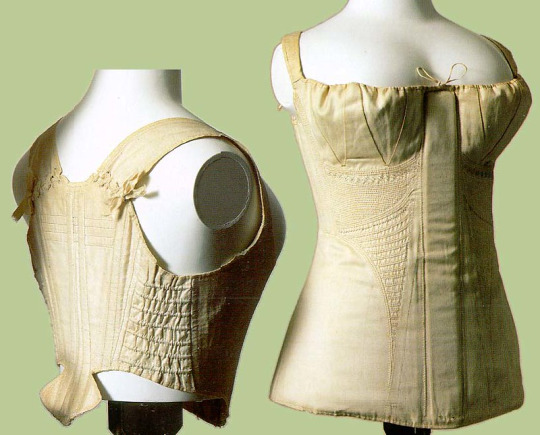
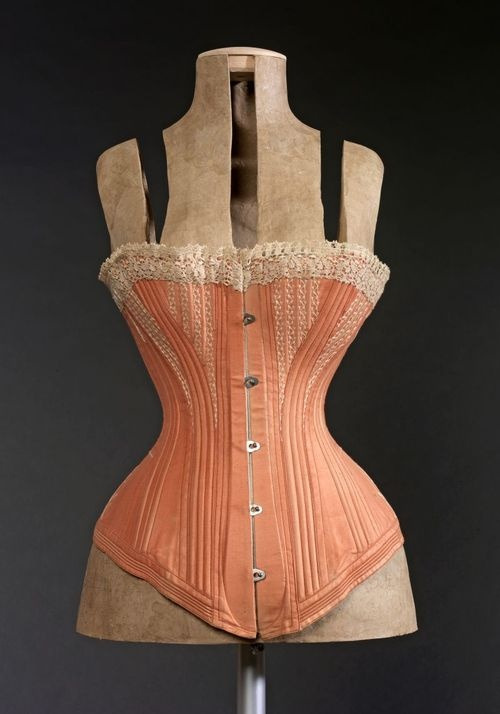
That's why the corset tightening scene in Bridgerton is so stupid, because why would you tight lace your daughter down when her dress looks like this? No one would even notice it!
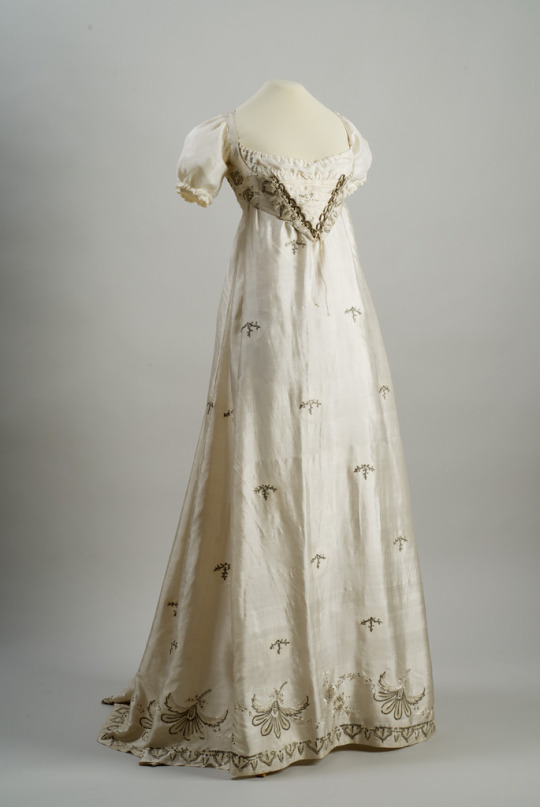
It's just very funny to me that Hollywood insists that corsets were these anti-feminist woman torture contraptions when women on the red carpet still wear corsets under their dresses today! like no, Zendaya's not free-titting it under this dress. it's just underwear, man.
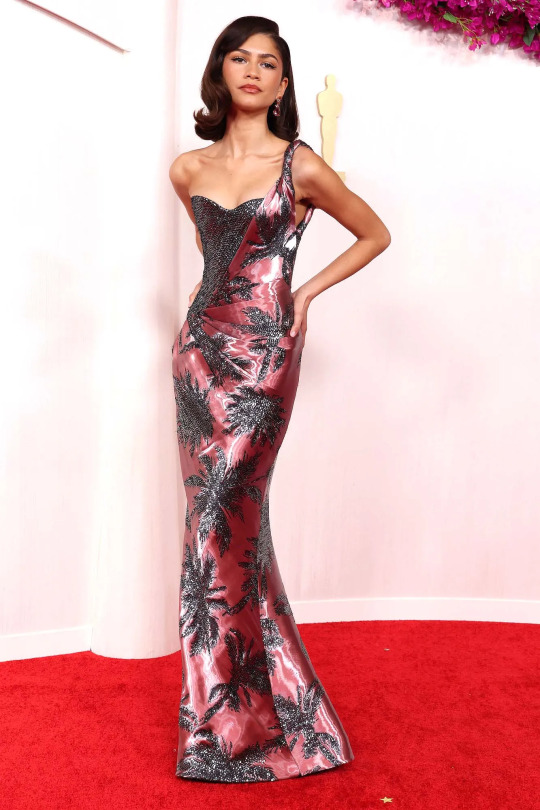
5 notes
·
View notes
Text
Character ask: Beth March (Little Women)
Not tagged by anyone; I'm just having strong Beth feelings that I'd like to share.
Favorite thing about them: The way she highlights the value of people who are easy to overlook or dismiss. Not only is Beth shy, quiet, unambitious, and self-effacing compared to her sisters, she’s clearly not “normal” either. She’s not just shy, but “afraid of people”; she’s been homeschooled because her social anxiety is too strong for regular school; she still plays with dolls and has imaginary friends at age 14; she has no desire to get married or have children and wants to always live with her parents. If she had lived past her early 20s, she would never have led a “normal adult” life, and for that reason she has low self-esteem and thinks she was “never meant to live long.” Yet her life isn't "useless" the way she fears it is. Her warmth and kindness, and the simple good deeds she does for everyone she knows, make an enormous impact. Everyone adores her, the lives of her family and friends are made better by her presence, and during her illnesses they teach her how much she matters as they all rally around her and care for her. I’ll admit, I relate to Beth much more than most readers seem to: as a person with autism, I’m also quiet, socially anxious, highly sensitive, less “grown-up” than other people my age, still dependent on my parents, single, with no full-time job, and without much drive to “achieve” anything (thank you, executive dysfunction). But I hope that my kindness and friendliness to others, and the small good deeds I do like volunteering to help the homeless, still give my life some worth. The emphasis on the value of Beth's life reminds me of the value of my own.
Least favorite thing about them: Not about her personally, but the views that so many readers take of her. I think most commentary written about her is terrible, especially when people argue that her death really is necessary because she’s not suited to this world. That’s just the opposite of the beauty I see in her story! I detest the way SparkNotes interprets her as a symbol of weak, insipid 19th century femininity, who “needs” to be killed off in the name of feminism, and it annoys me to think of all the students probably being taught to view her that way because they rely on SparkNotes’ study guides. Possibly even worse is the idea that she “needs to die” because she’s pathologically unwilling to “grow up,” or that “domesticity kills her” because she contracts her illness by caring for sick children, or that she’s not really happy in her domestic life but just lacks any “talent” for anything else, or conversely, that Alcott idolizes her as the perfect role model of passive, self-effacing femininity whom all her sisters need to learn to be like, making the entire book anti-feminist. (Nonsense – if any character in this book is framed as “the ideal woman,” it’s Marmee, not Beth.) More people who empathize with her instead of just viewing her as a foil for Jo should step up and write about her for a change!
Three things I have in common with them:
*I’ve always been socially awkward and solitary.
*I love music.
*I’ve always been “young for my age.”
Three things I don’t have in common with them:
*I’m not very good at sewing.
*I’m more of a dog person than a cat person.
*I can’t play the piano.
Favorite line: From Part 1, in response to Marmee suggesting that she doesn’t have a “burden”:
“Yes, I have. Mine is dishes and dusters, and envying girls with nice pianos, and being afraid of people.”
I like that she explicitly spells out that she’s not an impossibly perfect saint (even though countless readers still view her as such). Her intense shyness isn’t just “sweet modesty” but something she struggles with, she feels longing and envy like anyone else, and she dislikes tedious housework too.
And from Part 2, about her fatal illness:
“It’s like the tide, Jo, when it turns, it goes slowly, but it can’t be stopped.”
brOTP: Her sisters, especially Jo.
OTP: None.
nOTP: Mr. Laurence, or any member of her family.
Random headcanon: She’s on the autism spectrum. It’s not the only way to view her, and yes, I’ve read argument that she only shows traits of social anxiety in the book, not autism, and that only the 2019 movie gives her more autistic traits. But as a person on the spectrum myself, and based on the book alone, I think it makes perfect sense to view her this way.
Unpopular opinion: She’s a person, not a symbol. Yes, she’s the most idealized March sister because she’s based on Alcott’s beloved dead sister Lizzie. But she’s not “a two-dimensional self-sacrificing Christ figure,” nor is she a symbol of domestic femininity, nor of Jo’s fleeting childhood, nor of anything else. She’s a human being, and she has feelings, desires, likes, dislikes, quirks, and yes, even flaws, however small. She also grows as a person just like her sisters do: in Part 1 overcoming enough of her shyness to make new friends, and in Part 2 coming to terms with her illness and impending death. So many readers insist on seeing her as a symbol instead of a fully realized character, but I honestly don’t think that was Alcott’s intent.
Song I associate with them:
"Come, Ye Disconsolate," her favorite hymn.
youtube
“Some Things Are Meant to Be” from the 2005 musical – the duet she sings with Jo during their trip the beach, where first they enjoy fantasies together, and then Beth reveals that she knows she’s dying and comforts Jo.
youtube
Favorite picture of them:
This illustration of Beth with Jo, by Jessie Wilcox Smith:

This illustration by M.V. Wheelhouse of her sickbed, watched over by Jo:

This illustration by Frank T. Merrill showing her spirit being carried up to heaven by an angel (yes, it's cheesy religious sentimentality, but still beautiful):

This modern illustration by Elaine Gignillat:
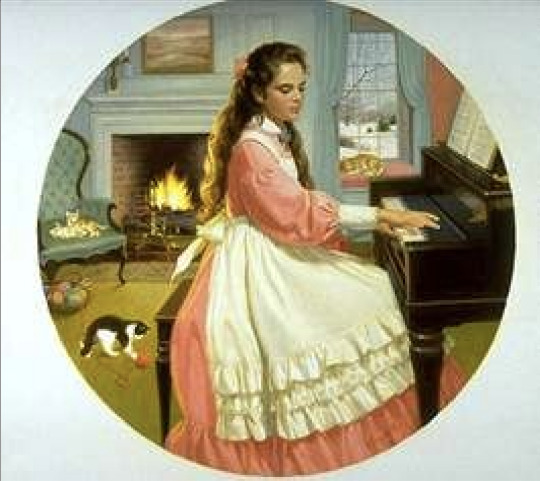
Jean Parker in the 1933 film:

Margaret O'Brien in the 1949 film:
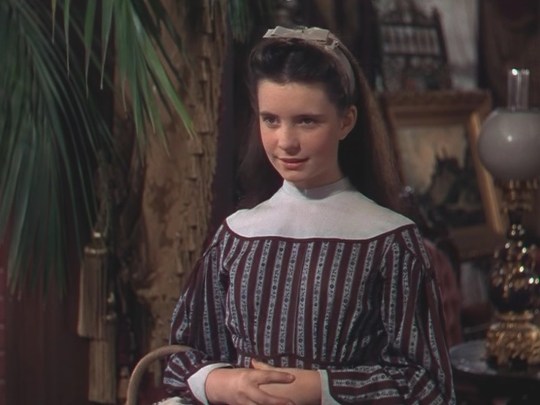
Eve Plumb (yes, Jan from The Brady Bunch) in the 1978 miniseries:

Claire Danes in the 1994 film:

Annes Elwy in the 2017 miniseries:
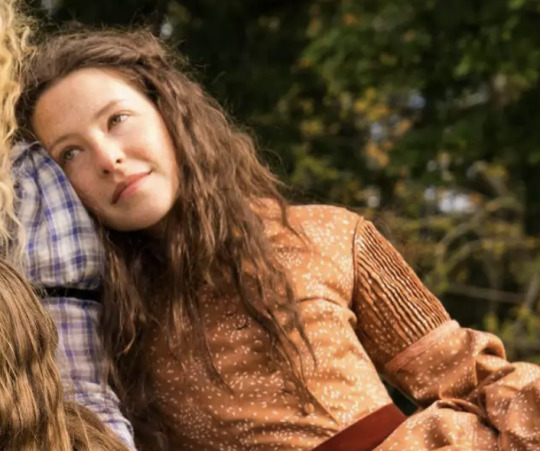
Eliza Scanlen in the 2019 film:

@littlewomenchannel, @thatscarletflycatcher, @joandfriedrich, @ariel-seagull-wings, @faintingheroine, @the-blue-fairie
#character ask#ask game#little women#beth march#louisa may alcott#tw: illness#tw: death#fictional character ask#fictional characters
23 notes
·
View notes
Note
The ask about radfems being right made me want to rant. The sheer vitriol against TERFs (including graphic rape threats which automatically makes them look sympathetic) made people forget some important points
1) radfems, and people who believe in radical ideologies, are very good at presenting the milder points of their philosophy. No radfem is dumb enough to go to someone like "men should be castrated before puberty for the safety of women", they'd start with something much milder like "I hate how teen boys get sex ed from porn at a young age" or something like that
2) the same line can have different meanings depending on the person. "We must protect vulnerable ethnicities at risk of genocide": a normal person might mean, I don't know, indigenous people being erased, and you might agree. But what if it's a white supremacist saying that, and he meant white people being replaced by mixed race people and immigrants? Very different context. Radfems employ similar strategies: "a dress doesn't make you a woman" can mean "gender is not tied to gender expression" or "trans women aren't women"
3) a broken clock is right twice a day. Just because a radfem says that the sky is blue, doesn't mean it's actually green. Just because she denounces Jessica Yaniv (because no one else does), doesn't mean you have to defend that person. Just because she says that the number of AFAB enbies who say "I'm nonbinary because I hate common women experiences like pregnancies" is worrying and might hint at internalized misogyny, doesn't mean she isn't right about that. Again, it's the entire context that makes radfeminism repugnant, but you can agree on some points for very different reasons.
And besides, we all know the woke left loves almost every radfeminist points except "trans bad" and "queer is a slur", so they don't get to complain :V
Mad agree (also I want to clarify that the ask wasn’t about radfems being right—it was about their base level claims often being right and easy to agree with, as well as easy to understand where those claims come from. And that’s how people go down the road of getting into the radical stuff, and ending up being batshit crazy radical feminists/terfs).
Your point about starting with milder takes is exactly what I was trying to get at with my response to the ask—and you gave a great example. On the surface, the take “I hate that teen boys get sex ed from porn” is an overall agreeable one. Porn is a terrible place to get sex education, in the same way medical shows are terrible places to learn what it’s like to be a surgeon, and cop shows are terrible places to learn what it’s like to be a cop. It’s all incredibly unrealistic.
So arguably, radfems are right when they make that surface basic claim, as it’s not a radical feminist exclusive claim. But then they manage to twist “teen boys are getting sex ed from porn and that’s bad” into “we should just castrate teen boys because men are inherently rapists and porn makes you a rapist”. And I would hope most rational people would go “holy shit wtf” to that claim.
And with the flexibility of lines, I see that a lot. I mean… it even happens with far right vs far left. Remember that post that said “white people shouldn’t adopt non white kids”, and a bunch of far leftists were agreeing because they believed white people adopting non white kids was racist… and it turned out the post had actually been made by a far right white supremacist, who believed that non whites were inferior to whites.
Terfs definitely take that into consideration. To myself, “a dress doesn’t make you a woman” means that dresses aren’t necessary to womanhood, and the lack of dresses isn’t necessary to manhood. To a terf, “a dress doesn’t make you a woman” means “trans women are men in dresses”.
And yes, thank you for pointing out the broken clock thing. Because obviously a radfem can say something sensical. Not everything that comes out of a radfem is necessarily radfem beliefs… so trying to act like anything a radfem ever says must be terf rhetoric is ridiculous. It’s just that most of the stuff radfems are “right” about are those surface level claims (again, like “a dress doesn’t make you a woman”) that aren’t actually radfem belief. It’s when you put that statement into the context they see it in, when it becomes radfem belief. That still doesn’t make the base claim wrong or radfem, though. Just the context radical feminism gives it.
Even “queer is a slur”… that’s not radfem belief. Do a lot of radfems believe queer is a slur? Yes. But something tells me that’s less about them being radfems, and more about many radfems being wlw (or at least claim to be wlw). The ones who aren’t claim to be allies (despite likely supporting political lesbianism). So is it really that surprising that a group largely filled with wlw, people who think they’re wlw, and people who think they support wlw, is against a homophobic slur being treated as if it’s not a homophobic slur???
I also agree that terfs are able to rack up a lot of sympathy from the constant hatred thrown their way. I know we all dislike terfs. But aggressively hating them is exactly what they want!!! Because then they can say things like “they’re silencing us because they don’t want to hear the truth”, or claim victimhood because clearly everyone hates them because something something patriarchy misogyny sexism. I’ve seen so many terfs take pride in the hatred they get, and it only solidifies their beliefs and turns others towards them. So no, constant “fuck terfs” posts don’t do any good. They just fuel the fire of the radfem oppression complex.
And it’s completely true that a lot of progressives actually would agree with radfem beliefs in full context, as long as it didn’t have “radfem/terf” attached onto it. And as long as it had nothing to do with trans people. Mainly anything talking about how evil men are.
Anyways, great points!!
30 notes
·
View notes